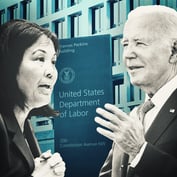(Bloomberg) — The world’s largest money manager said the U.S. government’s effort to protect retirement savers from excessive fees and unscrupulous brokers would favor index funds at the expense of other products investors should use.
BlackRock Inc.’s views, outlined in a letter sent to the Department of Labor Tuesday, adds pressure on President Barack Obama’s administration to change a proposal that would tighten rules on brokers who handle retirement accounts. The government’s plan would force brokers to act in the best interest of clients, even when such a recommendation earns them lower fees.
Selecting index funds, which track a basket of securities and tend to carry lower fees, could provide brokers an escape hatch from the complex rules, under a proposal issued by the Labor Department in April. The plan questions whether there should be a broad exemption for sales of “high-quality, low- fee” investments, which BlackRock says would be index funds.
“We feel strongly that would be an inappropriate choice,” said David Blass, general counsel of the Investment Company Institute, the trade group for mutual funds. “There are many funds beyond low-cost index funds that could be appropriate for any individual retirement saver’s portfolio.”
Subpar Advice
Labor Secretary Thomas Perez told a Senate panel Tuesday that his agency is willing to hear industry feedback but insisted that current rules, largely enforced by the Securities and Exchange Commission, don’t safeguard investors from high fees and greedy brokers.
“The problem with our system in the U.S. is it incentivizes complexity when simplicity is all too frequently what’s called for,” he said at a committee hearing where lawmakers grilled him about the plan. “It incentivizes complexity because complexity generates more fees.”








 July 22, 2015 at 07:00 AM
July 22, 2015 at 07:00 AM









